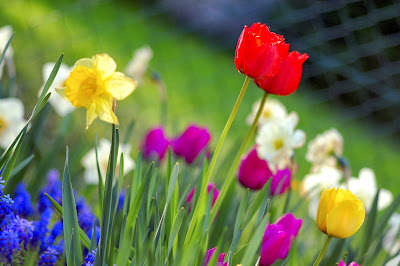For the past few months I was intensively following the primary presidential campaign in the US. It is a great source for learning about leadership, communication but also discipline and perhaps most of all commitment to hard work. I hoped for the presidential race to come to Williamsport. And guess what? Yesterday, the former president of the United States of America – Bill Clinton visited Lycoming College!
How was it? Well, of course - GREAT! What happened then?
Let’s start from the beginning. After coming to USA I was very sceptic about the country. A lot of things did not seem right. In general, it looked as if people were overwhelmingly focused on consumption, living without any consideration for the consequences of their actions. One recent example was in my marketing class. We were talking about product life cycles and the professor asked how many people in the class used energy efficient light bulbs in their houses. Only two out of almost forty people raised hands… It was very worrying. President’s Clinton speech made me realise there is still hope for a change, though.
Topics of the speech
During his 1,5 hour speech Mr Clinton addressed a number of issues. He talked about the war in Iraq, the housing bubble, international relations and global warming.
 |
| High performance leadership |
Interestingly, global warming was the part of his speech that he put the most effort into. He said some pretty obvious stuff, but approached it from another angle. He basically said that countering global warming would create new jobs. First, infrastructure for increasing energy efficiency would have to be built, creating demand for electronic engineers. Second, somebody would have to lay this infrastructure down. This way new jobs would be created, but even more importantly, jobs that cannot be outsourced to another country (big deal in America right now). Anyway, what he said might not have been a revelation but it was definitely inspirational. It was good to hear directly from somebody in this position that these issues matter.
Rallying the crowd
In the end the crowd looked like hypnotised. I wondered how Mr. Clinton achieved that. A couple of things came to my mind. Most of all, he was a person like everybody else. He did not use a difficult language; he talked about people’s problems and not about superficial and unrelated matters.
 |
| In person |
Mr. Clinton used metaphors to explain complex issues to the crowd and also humour to brighten everybody up, constantly pointing at the future. He did say that America's bigges concerns were the economy and the country’s relations with the rest of the world. But rather than using complicated economic terms he said that the aim of this campaign was that when his wife leaves the office, people are better off, seeing a brighter future for their children and coming together rather than moving away from each other.
So in the end I learned two things. First, that there is still hope for America. Second, if you want your message to come across, keep it simple. It will save you time, energy, and it will work best!
UPDATE: video snapshot of the speech on YouTube — Bill Clinton at Lycoming College
UPDATE: video snapshot of the speech on YouTube — Bill Clinton at Lycoming College



